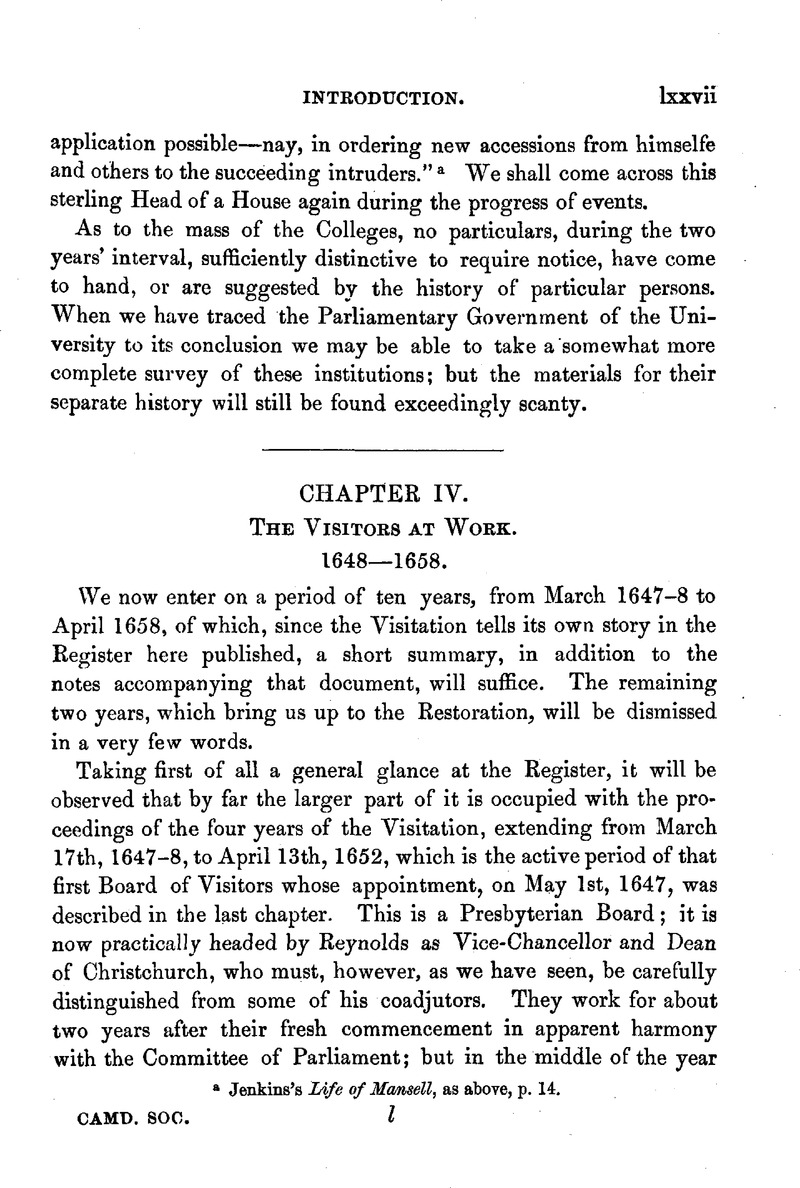No CrossRef data available.
Article contents
Chapter IV. The Visitors at Work. 1648–1658
Published online by Cambridge University Press: 04 January 2010
Abstract

- Type
- Introduction
- Information
- Camden New Series , Volume 29: The Register of the Visitors of The University of Oxford from A.D. 1647 to A.D. 1658 , December 1881 , pp. lxxvii - cvii
- Copyright
- Copyright © Royal Historical Society 1881
References
page lxxxi note a Lives of Eminent Men. bound up with Lives of the Poets.
page lxxxiii note a Of all the above cases perhaps there is none which throws more light on the struggle which must have gone on in the minds of learned and moderate Churchmen, who were also strong Royalists, than that of Pocock. His immense learning and high character procured him the most zealous friends in both parties. Preferred by Charles, patronized by Laud, protected by Selden, generously defended in his adversity by Dr. John Owen, his blameless character and honest resolution to do his duty carried him over all difficulties at last, even though he had to resign his Canonry for refusing the Engagement. He was still, however, allowed to retain his Hebrew and Arabic Lectureships, a large proportion of the new Heads of Houses and Professors joining in a petition to that effect presented to the Committee of Parliament; and at the Restoration he recovered his Canonry, which he held with the Professorship of Hebrew till his death in 1691. Few have left behind a more beautiful memory of a well-spent life. See Twells' Life of Pocock.
page lxxxviii note a See Note, p. 53.
page xci note a Life, &c. as above.
page xcii note a See Note to p. 317.
page xciii note a The word “Commencement” has long been superseded at Oxford by its synonym “Inception,” and that word itself requires explanation in the present day. It was the actual grant of the capacity of teaching, which took place at the first “Act” following upon the conferring of the Degree, or rather what is commonly supposed to be the conferring of the Degree, but which, strictly speaking, is only a licence for subsequent Inception. Hence the importance of the “Act” in past times, little recognized in the associations connected with the modern Encænia or Commemoration.
page xciii note b Or Caryl, the celebrated Independent minister. He attended Cromwell on his expedition to Scotland in 1650, along with Owen.
page xciv note a W. of All Souls, p. 72.Google Scholar
page xcv note a See Note on Zanchy, p. 277.
page xcvi note a See Note, p. 377.
page xcvi note b Macray's Annals of the Bodleian.
page xcvii note a Archives of All Souls.
page c note a Reg. Conv. T.
page cii note a Owen's parting address to the University contained the following record of honest work:—” Professors' salaries, lost for many years, hare been recovered and paid; some offices of respectability have been maintained; the rights and privileges of the University have been defended against all the efforts of its enemies; the treasury is tenfold increased.…. new exercises have been introduced and established, old ones have been duly performed; reformation of manners has been diligently studied in spite of the grumbling of certain brawlers … I congratulate you on a successor who is able completely to repair any injury which your affairs may have suffered through our inattention.” It should be mentioned that Owen sat for a short time in Parliament as Burgess for the University.
page ciii note a Life, p. 27.Google Scholar
page cvi note a Hist, of the Great Rebellion, book x. vol. v. p. 482Google Scholar, Oxf. ed.


